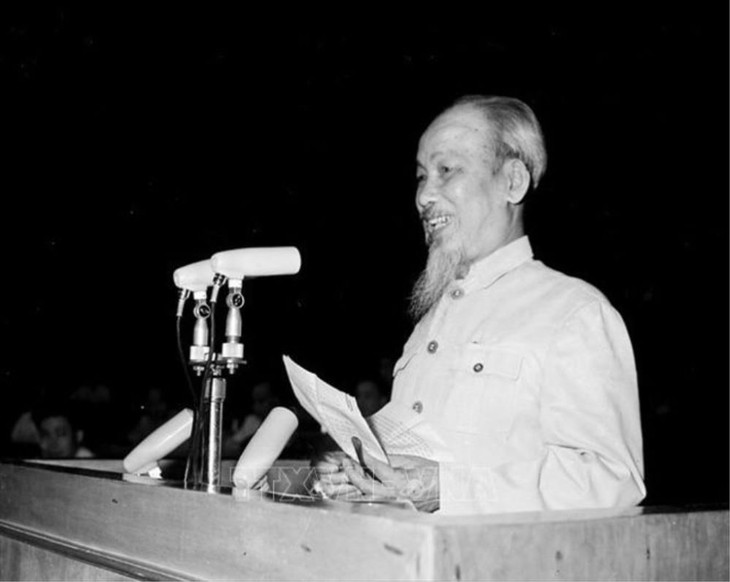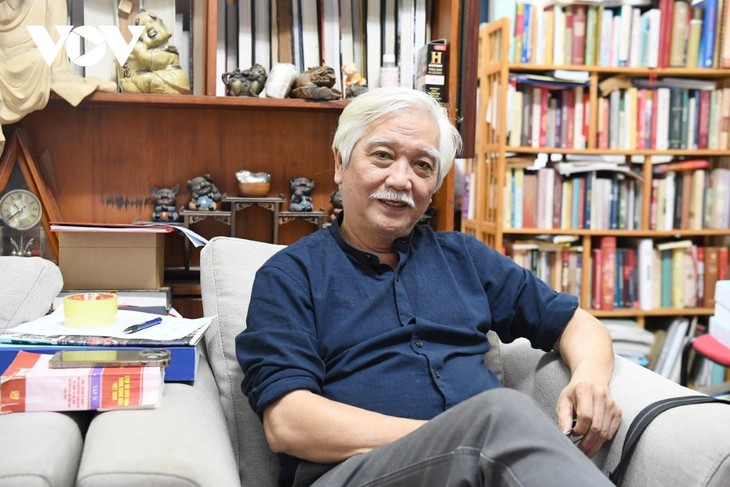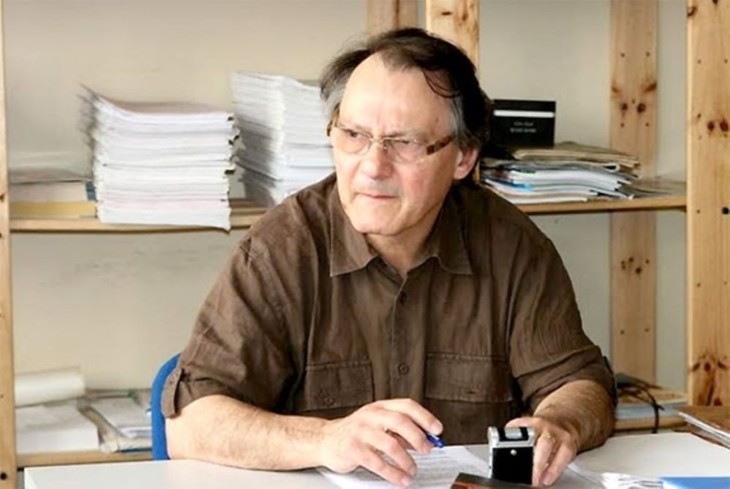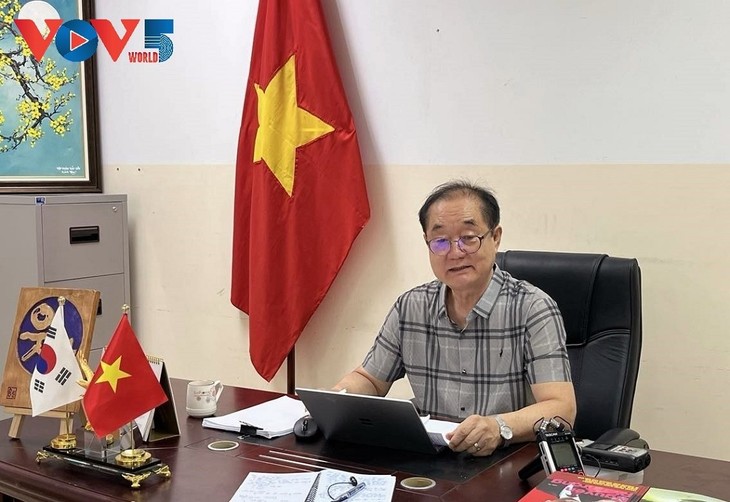 President Ho Chi Minh addressing the opening ceremony of the 2nd session of the 3rd National Assembly, April 7, 1965. File photo: VNA President Ho Chi Minh addressing the opening ceremony of the 2nd session of the 3rd National Assembly, April 7, 1965. File photo: VNA
|
Ho Chi Minh's thoughts on international solidarity: a vision beyond time
President Ho Chi Minh's views on international solidarity were thorough and consistent. He recognized early on that the national liberation revolution following the path of the proletarian revolution had to mobilize and gather the strength of international solidarity to achieve victory. President Ho Chi Minh's thoughts on solidarity clearly demonstrate his wisdom and vision.
International solidarity, according to President Ho Chi Minh's thought, is non-discrimination, equality, mutual benefit, and respect for each other's independence, sovereignty, and territorial integrity. He advocated a spirit of self-reliance with one relying mainly on one's own strength as well as a logical and loving approach. He emphasized that Vietnam bases its friendly and cooperative relations with other countries on the principles of respecting each other's sovereignty and territory, non-infringement on each other rights, non-interference in each other’s internal affairs, equality, mutual benefit, and peaceful coexistence.
These thoughts and vision are timeless. As historian Duong Trung Quoc put it: "We know that the international Communist movement endured many challenges. After the Second World War, the world was polarized. At that time, Vietnam was aiming at the ultimate goal of achieving national independence and national unification. President Ho Chi Minh, with a very skillful approach based on wanting to restore the ideals of the Communist movement as it once existed, pointed out the necessity of national unification."
 Historian Duong Trung Quoc. Photo: VOV Historian Duong Trung Quoc. Photo: VOV
|
According to Ho Chi Minh, international solidarity means taking advantage of external resources to intensify the struggle for national independence and construction. National strength and era strength are combined into synergy.
"From the beginning, the Vietnamese Revolution was determined to be part of a world revolution. So how the Vietnamese Revolution was influenced by international support, especially the support of the Soviet Union and China and other brother countries, was a crucial factor."
"The diplomatic front had a great effect, rallying progressive people around the world to back and assist the resistance war of the Vietnamese people."
In return, Vietnam had a responsibility to back and assist other countries in fulfilling their international obligations. International solidarity creates strength. Zhang Dewei, Chinese ambassador to Vietnam from May 1989 to February 1993, said: "Ho Chi Minh paid great attention to and emphasized unity as well as how to unite all progressive forces in the world, all righteous forces in the world."
President Ho Chi Minh’s teachings on international solidarity
55 years ago, in his Testament, President Ho Chi Minh left behind valuable instructions on achieving international solidarity.
According to Dr. David Marr, one of the leading scholars of Vietnamese history, President Ho Chi Minh’s Testament clearly demonstrated his wisdom and vision. It not only reflected national liberation efforts but also expressed a global vision of peace and justice.
Dr. Michel Duhamel, an expert on revolutionary movements, said Ho Chi Minh's Testament has a far-reaching significance for the international solidarity movement. It encourages countries and peoples around the world to cooperate and support each other in building peace and sustainable development.
 French historian Alain Ruscio. French historian Alain Ruscio. Photo: lanouvellerepublique.fr
|
French historian Alain Ruscio said:“The life of President Ho Chi Minh’s biggest message is that leaders of Socialist countries and Communist parties must remain close to the people and concerned about the suffering of the people and must always take the lead in condemning and fighting the evils of corruption, bureaucracy, and Communist ideological degradation. President Ho Chi Minh was the image of an outstanding person and a respected Communist leader. I think that message still holds true today.”
Jean-Pierre Brard, former Mayor of Montreuil, France, told VOV5: “President Ho Chi Minh was an exceptional revolutionary. We clearly see in him a great love for his homeland, for the people, and for peace.”
Russian researcher Evgeny Kobelev said Ho Chi Minh's ideology is typical of international revolution. He was a hero who fought for national liberation but the Vietnamese revolution cannot be separated from the international revolution.
Experts studying Vietnam emphasize that to truly understand the soul of the Vietnamese people, one must first explore the life and legacy of President Ho Chi Minh, particularly his Testament. South Korean professor Ahn Kyong Hwan, an expert on East Sea issues and Vietnam, shared this perspective with VOV.
 South Korean Professor Ahn Kyong Hwan is an expert on East Sea and Vietnam study. Photo: VOV5 South Korean Professor Ahn Kyong Hwan is an expert on East Sea and Vietnam study. Photo: VOV5
|
What impressed you most when you first read President Ho Chi Minh's Testament?
To understand President Ho Chi Minh, it's important to explore his works, including his Testament. I wanted to share this with the Korean people, so I translated the Testament and organized an international conference to present it. I see President Ho Chi Minh as a leader who deeply loved his country and people, and who passionately sought to unify Vietnam. What impressed me most about the Testament was President Ho's focus on unity. He believed that Vietnam could only progress if the Vietnamese people were united, both within the Party and internationally.
Do you think his view on solidarity is still relevant today?
For President Ho Chi Minh, independence and freedom were the most valuable ideals. He dedicated his life to promoting these values, not just for Vietnam but also in the fight against colonialism, feudalism, imperialism, and fascism, supporting the freedom of oppressed peoples everywhere. President Ho Chi Minh was a pacifist who believed in resolving international conflicts through peaceful dialogue to avoid war. Embracing his approach could help maintain global peace, and the world can learn much from his commitment to peace and non-violence.
How did scholars respond when you presented President Ho's Testament at the International Academic Conference in 2015?
In 2015, despite strong economic ties between South Korea and Vietnam, few Korean scholars and people were familiar with President Ho Chi Minh. When I introduced his Testament, the delegates and scholars gained a deeper understanding of his dignity, patriotism, and love for peace. Through this Testament, they were able to appreciate President Ho Chi Minh's greatness once more.
In your opinion, how have the Vietnamese people realized President Ho Chi Minh's Testament?
President Ho Chi Minh's Testament greatly contributed to Vietnam's development. Since the Renewal policy in 1986, Vietnam has attracted foreign investment and grown into a strong, livable country. Looking ahead, I believe the Party and the people will continue to unite, elevate Vietnam's global standing, make the country stronger, and contribute more to world peace.
International solidarity enhances Vietnam's position in today's era
During his lifetime, President Ho Chi Minh paid attention to building, maintaining, and developing the close solidarity between Vietnam and China, the Soviet Union, and many other fraternal socialist countries, as well as with the peoples of Asia, Africa, and Latin America. Since Vietnam's reunification, it has been consistently pursuing a foreign policy of independence, self-reliance, diversification, and multilateralization, becoming a friend, a reliable partner, and a responsible member of the international community.
Here are assessments of foreign diplomats, experts, and researchers.
“Over the last year, Vietnam had received Chinese President Xi Jinping, American President Joe Biden, and Russian President Vladimir Putin. Vietnam can maintain its thoughts that it demonstrates that each party, each major power – America, China, Russia has an interest in seeing that Vietnam remains stable, active, and influential. Otherwise, it might have to be forced to join another country, if too much pressure is put on Vietnam, so it demonstrates that Vietnam does not have to commit to join one party against another, but can retain its independence."
“I think it highlights Vietnam’s prominence on the world stage, it highlights the emergence of its comprehensive partnership. But now really the hard work needs to be done. I think one of things that will happen at this meeting is where, literally, as we use that term, where the rubber meets the road, where issues can be discussed and worked out. It is a very exciting time and also reflects Vietnam’s emergence as a critical player in world political events. So, I am excited about that.”
“Vietnam has been spearheading in the economic development, economic progress of this region and also in doing that by narrowing the development gap among the ASEAN countries and also in advancing the regional integration. I still remember Vietnam’s chairmanship during the pandemic time in 2020. All the world including the region was in very unprecedented challenges from this disease. And Vietnam showed important leadership during this period. And especially by organizing the special summit and meeting, a special ASEAN Summit on COVID-19 and also a special ASEAN Plus 3 Summit meeting which demonstrated the united willingness of the countries to support each other to get over these unprecedented challenges together in collaboration. So, we and all the regional countries appreciate it very much on Vietnam’s leadership in this very difficult time.”
What Vietnam has achieved shows that international solidarity outlined in President Ho Chi Minh's Testament is not only a noble ideal but also an indispensable part of Vietnam's foreign policy. International solidarity has become a truth, a necessary guiding principle for action, contributing to building Vietnam's position and prestige and fostering a peaceful world.